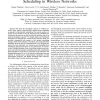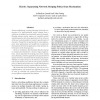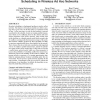316 search results - page 26 / 64 » Oblivious interference scheduling |
ICDCN
2010
Springer
15 years 7 months ago
2010
Springer
Abstract. The availability of multiple orthogonal channels in a wireless network can lead to substantial performance improvement by alleviating contention and interference. However...
122
Voted
INFOCOM
2008
IEEE
15 years 7 months ago
2008
IEEE
Abstract—We study the throughput capacity of wireless networks which employ (asynchronous) random-access scheduling as opposed to deterministic scheduling. The central question w...
108
click to vote
IPPS
2002
IEEE
15 years 5 months ago
2002
IEEE
Multiple memory module architecture enjoys higher memory access bandwidth and thus higher performance. Two key problems in gaining high performance in this kind of architecture ar...
102
Voted
MOBISYS
2005
ACM
16 years 2 days ago
2005
ACM
Inverse multiplexing, or network striping, allows the construction of a high-bandwidth virtual channel from a collection of multiple low-bandwidth network channels. Striping syste...
115
click to vote
MOBIHOC
2008
ACM
16 years 2 days ago
2008
ACM
Broadcast scheduling is a fundamental problem in wireless ad hoc networks. The objective of a broadcast schedule is to deliver a message from a given source to all other nodes in ...



